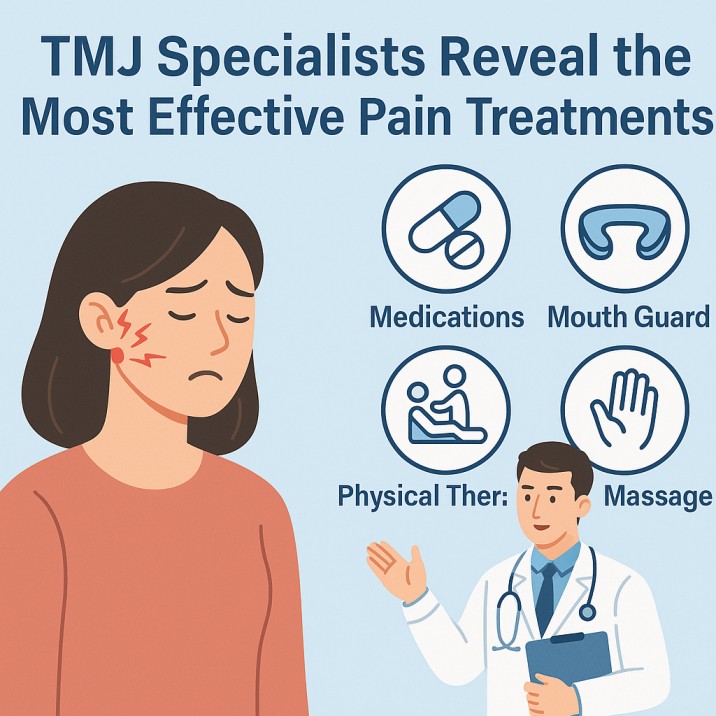If you’ve been experiencing jaw pain, difficulty chewing, headaches, or a clicking sound when you open or close your mouth, you may be dealing with Temporomandibular Joint Disorder (TMJ or TMD). This condition affects the joints that connect your jawbone to your skull and can lead to a range of painful, disruptive symptoms.
At Saranya Dental, our TMJ specialists understand just how challenging this condition can be—and we’re here to help. The good news is that TMJ disorder is treatable, and there are a variety of effective methods to reduce pain, improve function, and restore your quality of life.
In this guide, our specialists reveal the most effective TMJ pain treatments available today.
Understanding TMJ Disorder
The temporomandibular joints are located on each side of your jaw and act like sliding hinges, allowing you to speak, chew, and move your jaw smoothly. TMJ disorder occurs when something goes wrong with this system—either due to inflammation, injury, stress-related clenching, arthritis, or misalignment.
Common symptoms include:
- Jaw pain or tenderness
- Headaches or earaches
- Clicking, popping, or grating sounds
- Difficulty opening or closing the mouth
- Facial pain or swelling
- Locking of the jaw
These symptoms can range from mild discomfort to severe pain that interferes with daily life.
- Custom Nightguards and Oral Appliances
One of the most effective first-line treatments for TMJ is the use of custom nightguards or oral splints. These devices are worn at night to reduce teeth grinding and clenching, which are major contributors to TMJ pain.
At Saranya Dental, we provide custom-made appliances designed to fit your mouth perfectly. Unlike over-the-counter guards, these are made with medical-grade materials and personalized for optimal comfort and function.
Benefits:
- Reduces pressure on the jaw joint
- Minimizes teeth grinding (bruxism)
- Helps realign the bite for proper joint positioning
- Physiotherapy and Jaw Exercises
TMJ pain often involves muscle strain and inflammation. Physiotherapy and targeted jaw exercises are highly effective in relaxing the muscles, increasing mobility, and improving joint alignment.
Our dental team collaborates with physiotherapists to create personalized exercise plans that include:
- Stretching and strengthening the jaw muscles
- Manual therapy to release tight muscles
- Heat or cold therapy to reduce inflammation
These exercises, when done consistently, can significantly decrease pain and improve jaw function.
- Medications for TMJ Relief
In some cases, medication may be necessary to manage TMJ symptoms, especially during flare-ups. TMJ specialists may recommend:
- Anti-inflammatory medications (NSAIDs) such as ibuprofen to reduce pain and swelling
- Muscle relaxants to ease tension in the jaw muscles
- Low-dose antidepressants, which have been shown to help manage chronic pain and improve sleep in some patients
These medications are typically used alongside other treatments, not as a long-term solution.
- Trigger Point Injections and Botox
For patients who suffer from chronic or severe TMJ pain that doesn’t respond to conservative treatments, trigger point injections or Botox® therapy can offer relief.
- Trigger point injections involve injecting a small amount of anesthetic into the painful muscle area to relieve tension.
- Botox injections work by relaxing overactive jaw muscles and reducing involuntary movements like clenching and grinding.
Both options are minimally invasive and have been shown to significantly reduce TMJ-related pain in many patients.
- Stress Management and Behavioral Therapy
Stress plays a significant role in TMJ, often leading to clenching, grinding, and muscle tension. Learning to manage stress can be an important part of TMJ treatment.
Cognitive behavioral therapy (CBT), relaxation techniques, and biofeedback can help patients:
- Become more aware of harmful habits like clenching
- Reduce muscle tension
- Improve sleep and emotional well-being
At Saranya Dental, we take a holistic approach and may recommend stress-reducing practices like meditation, yoga, or professional counseling if emotional triggers are part of your TMJ condition.
- Corrective Dental Treatments
In some cases, TMJ symptoms are caused or worsened by issues with the bite (malocclusion), missing teeth, or poorly aligned dental restorations. In these situations, corrective dental procedures may be necessary, such as:
- Rebuilding worn teeth
- Orthodontics (braces or aligners)
- Replacing missing teeth with crowns or implants
Our TMJ specialists will assess your bite and jaw alignment to determine if dental correction is a part of your personalized treatment plan.
When to See a TMJ Specialist
If you’re experiencing persistent jaw pain, clicking, or headaches that don’t go away with simple at-home care, it’s time to schedule an evaluation. Early intervention can prevent symptoms from worsening and reduce the risk of long-term joint damage.
At Saranya Dental, we offer advanced diagnostic tools and customized treatment plans to target the root cause of your TMJ pain—not just the symptoms. Our goal is to help you regain comfort, function, and confidence in your daily life.
Take the First Step Toward TMJ Relief
TMJ pain can affect your ability to eat, speak, sleep, and enjoy everyday life—but it doesn’t have to. With the right treatment and expert care, relief is within reach.
Contact Saranya Dental today to schedule a consultation with our TMJ specialists and begin your journey toward lasting comfort and better jaw health.

